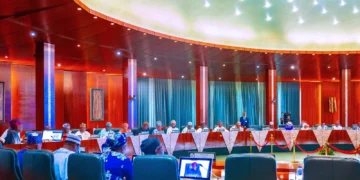Insecurity has continued to persist in our economy, and the industry has been booming over the years, dismembering various sectors of our economy from robust GDP contributions and creating an ungovernable space that makes it difficult for development to thrive.
This phenomenon has often been viewed as a foreign kind of aggression, usually perpetrated by foreign governments, especially neighboring countries or nations with hostile dispositions toward each other and poor diplomatic relations. It can also be bred by countries competing for economic reasons.
Typically termed terrorism, it has morphed into various forms, and even the most advanced countries in the world today are battling what has now come to be known as domestic terrorism. Terrorism is no longer an import; it is homegrown through and through.
When Charles Soludo, the Anambra State Governor, declared that terrorism in Anambra State is perpetrated by indigenes, many felt he was playing to the gallery and cosying up with the government of the day. Dikko Radda, PhD, the Katsina State Governor, also made similar comments about terrorism in Katsina.
In one of the raids by combined security forces in the state, in which Dikko Radda participated, he questioned residents of a village on the outskirts of Batsari, where bandits who were confirmed to have a base fled the area hours before the raid. He pointed to clothes and other belongings around, which were obviously left behind by the fleeing ragtag terrorists.
This points to the complicity of indigenes or residents of these bandit-infested areas, which has made the warfare too asymmetric in nature, thus blurring the successes of the war against banditry. It is therefore very pertinent that governance is taken a lot more seriously, as terrorism is decimated by the continued delivery of democratic dividends that eradicate its spread and the growth of the ready population that serves as fertile ground for the recruitment of terrorists.
State governments must be seen to continue pursuing programs and policies that contribute equally to the development of rural areas, especially those that harbor bandits. Terrorism wins when governance is crippled and overwhelmed by the focus on fighting a contrived war that seems hell-bent on boring endless holes in our society’s economic prosperity.
Governments must also be prepared to wage a dynamic war on the spread of misinformation and the glorification of bandits and their activities, which are often cowardly attempts on small and soft targets for want of attention. The efforts of our security forces and hybrid security teams alongside local vigilantes must be made public so as not to allow for the propagation of the narrative that terrorism is winning and nothing is being done to curb it.
Political terrorism has been squarely identified as responsible for the recent upsurge in insecurity challenges. The obvious goal is to discredit the government and erode the footprints of the developmental milestones reached. Governments must be very conscious of this wave of terrorism and be up to the task of upstaging it and redirecting the narrative that terrorism is winning when, in fact, it is on its knees.
Over 130 security personnel lost their lives in combat against terrorists in Katsina State, with quite a number from the state-developed Community Watch Corps, who have been gallant in their partnership with the army, the police, and, most recently, the DSS. Thousands of kidnap victims have been rescued by security forces across the country.
The bandits have not found it easy, and deadly blows have been dealt to them countless times. Their resurgence from time to time is harbored by the porousness of our borders, and states like Katsina are prone to fresh attacks by illegal immigrant groups that launch new attacks on border communities.
However, this new wave of political terrorism is not left to roam unabated. The federal and state governments have been up and doing. They are responding very strongly to the new heights of the insecurity situation.
It is indeed encouraging that governors of the Northwest are not relenting and allowing banditry to distract them from developing human capital in their respective states and utilizing their resources in providing social welfare. Infrastructural developments have spurred on, and the general landscape of the region is hugely dotted with projects that are very key to the development of the region.
For example, just a week ago, the Katsina State Government launched a training program for 18,000 teachers, along with the distribution of 20,000 tablets. The program is a step-down training program for 18,000 teachers and commenced the distribution of 20,000 tablets to selected beneficiaries, aimed at enhancing teaching quality and improving educational outcomes across the state.
The Governor outlined key initiatives undertaken by the state to revamp the education sector. These include the distribution of school materials and 30,000 uniforms to less privileged children, provision of specialized teaching aids for schools for the blind and deaf, installation of CCTV cameras in 130 schools to enhance security, and the provision of 70 motorcycles to monitoring officers to improve school supervision, particularly in rural areas. “These are not just statistics but a strategic investment in the future of our children,” he stated. “By equipping teachers with modern tools and necessary training, we are aligning our educational system with global standards to prepare our students for 21st-century competitiveness.”
The Commissioner of the Ministry of Basic and Secondary Education, Hajiya Zainab Musa Musawa, described the initiative as “a significant milestone” in the state’s quest to restore the glory of education. She expressed appreciation to the World Bank, UBEC, and other partners for their collaboration, reaffirming the government’s commitment to continuously empowering teachers through capacity-building initiatives designed to enhance teaching and learning.
Hajiya Binta Abdulmumini, the State Project Coordinator of the TESS program, explained that the initiative, implemented in collaboration with the World Bank and the Federal Government, would train 18,000 teachers through 90 master trainers who had undergone prior specialized training. Each participating teacher would also receive a tablet preloaded with lesson plans and digital teaching resources.
The Chairperson of the Katsina State Teachers’ Association, Hajiya Rakiya Shehu, lauded the government’s commitment. I believe that such commitments significantly help push back against insurgency. Such programs reclaim environments and people that would have otherwise been recruited into the terrorism ecosystem.
Dr. Dikko Radda is living up to the expectations of keen observers and Katsina state elders and stakeholders who have great confidence in his capacity, dedication, and experience. I was perturbed by the fact that we had just lost Baba Buhari, and Dr. Dikko Radda, in his usual workaholic style, was traversing the Katsina-Daura road multiple times a day, hosting guests and dignitaries who were thronging Katsina state to offer condolences.
In one such short journey, the Katsina state governor had an accident, and my heart skipped more than a bit. I was consoled by the news that he was okay and recuperating fast from treatment, and I felt compelled to tell him: Not so fast, Dr. Radda! We just lost a colossus and great leader in Baba Buhari, and we don’t want to lose you so early. We need your bravery and commitment to eradicating banditry in Katsina and transforming education.
We pray that the Almighty, the Omnipotent of all, crowns our security forces’ and leaders’ efforts with a resounding victory over banditry in Nigeria.





